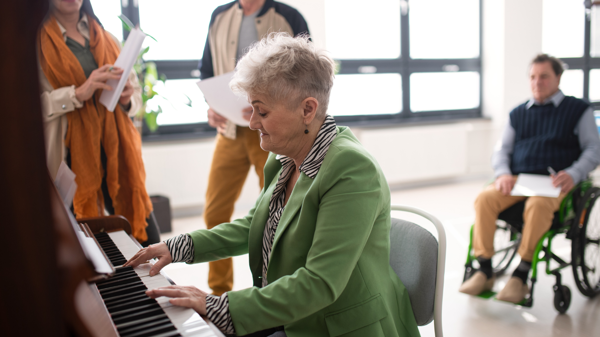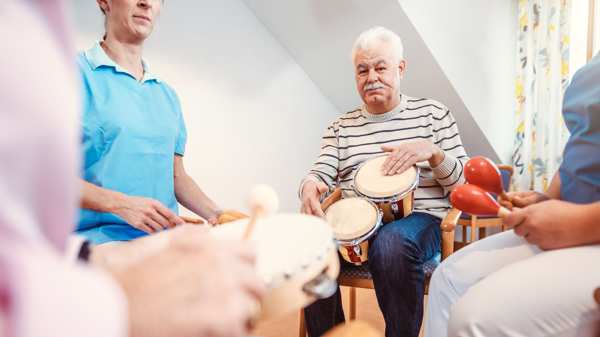The Power of Music Fund and the Music Can digital platform will be launched on 8th November at a special event for policy-makers, charities and health leaders at Universal Music UK’s offices. Together these initiatives will provide support through music - a ‘social prescription’ that evidence suggests could help improve the lives of the 944,000 people currently living with dementia in the UK [1].
Opening for applications on 22nd November, the Power of Music Fund will allow grassroots dementia choirs and music groups to apply for small grants to cover basic costs, like room hire, travel and refreshments. There will also be one larger grant of £500,000, available for a new Centre of Excellence; a partnership between health and care providers, voluntary organisations, music providers and dementia support organisations. The Centre of Excellence will test new approaches to embedding music as part of dementia care, gather evidence of cost savings for the NHS, and design new models of care which could be scaled up and spread across England.
Most of us will be affected by dementia in some capacity, at some point in our lives; 209,600 more people are estimated to develop dementia this year [2].
While there is currently no cure, research suggests that engagement with music can offer significant social, emotional and cognitive benefits for people living with dementia. For example, music therapy can reduce agitation and the need for anti-psychotic medication in 67% of people with dementia [3].
Cathy Sahadevan, who works at The Grange Care Home in Essex, has been running the One Voice choir for residents with dementia for five years.
She said: “We have all noticed a difference… Many of the residents remember more, are now using their reading skills again, talking more and being more sociable and sometimes, outside of rehearsals, they all burst into song.”
QUOTES FROM POWER OF MUSIC FUND SUPPORTERS AND PARTNERS
Actor Vicky McClure, Chair of Our Dementia Choir, said: “I’m really excited to see Music Can launched and out there. This is such a valuable resource for people living with dementia and those who care for them. We need to make it easy for people to be able to find and access services in their communities and navigate the array of digital offers available. Music Can does this and I would urge everyone who plays a role in supporting people with dementia – from family carers, to link workers, GPs, other health and care professionals, and musical dementia service providers – to use this incredibly valuable resource.
“It’s also fantastic to see new funding available for dementia choirs and music groups across the UK and I hope it helps them to keep doing what they do so brilliantly.”
Tony Christie, singer and Champion for the Music for Dementia campaign, said: “I've always known that music could make a huge difference to a person’s happiness, and that belief has grown even stronger since I was diagnosed with dementia. I always recommend people in my position to sing if they’re able to or just listen to music. It’s a huge help. I am delighted to support these projects, which will help people diagnosed with dementia to access music more easily – whether they are joining a local choir or using the Music Can platform.”
Rt Hon Sir John Whittingdale OBE MP, Creative Industries Minister, said: "Music can bring people comfort and connection in challenging times. Now more choirs and community groups can change the lives of patients and families through the power of music. I'm incredibly proud that public funding has helped make this support possible."
David Joseph, Chairman & CEO, Universal Music UK, said: “I’m delighted to see the fund and Music Can platform launch today. Both initiatives are perfect examples of the power of music, bringing music and healthcare to together to support people’s wellbeing right across the country.”
Neil Utley of The Utley Foundation, said: “It’s almost magical, when you see someone with dementia being reached by a favourite tune, a live performance, or a choir session. The Utley Foundation believes everyone who receives a diagnosis should be told music can help and be supported to find the best kind of music for them. NASP’s announcements today are a huge step forward in making that a reality and I am delighted we are kickstarting the Power of Music Fund with £1million. We encourage other investors to get on board with a project that offers a real vision for improving life for people with dementia and their carers.”
Darren Henley, CEO of Arts Council England, said: “People everywhere tell us how much they value opportunities to develop and express their creativity, both on their own and with others. That’s why it’s so important to ensure that everyone is given the opportunity to be involved, particularly those living with dementia where we know that music can positively impact their health and happiness. We are delighted to be funding the Power of Music partnership, which is bringing together the exceptional talent of musicians, choirs and orchestras from across the country to work with health and care professionals to bring joy to people, whatever their circumstances.”
Nicole Meissner, Managing Director and Partner at Boston Consulting Group, said: “Music Can is the first platform built to deliver bespoke dementia care of its kind based on the individual needs of those affected by this terrible condition. It has the potential to become a crucial tool not only for those living with dementia but also for their families and carers. It has been incredibly rewarding to see how technology, music and science can play an integrated role, working together to combat dementia’s effects. Our team is proud to have partnered with such fantastic organisations, all dedicated to this important cause, to create this unique platform.”
James Sanderson, Director of Community Health Services and Personalised Care at NHS England, said: “Research has highlighted the potential power of music for people living with dementia in helping to improve and bring back memories, build, maintain and reconnect relationships, and helping with mood and anxiety.
“The NHS is continuing to support millions of people through social prescribing link workers, working as part of the general practice team. Nearly 2.5 million people, including those living with dementia, have been referred to social prescribing to date. I am delighted to see the launch of the Power of Music fund to help maintain and boost music-based community activities for people living with dementia across England, providing another route to support people through social prescribing activities.”
Tony Followell, Chair of Trustees for Music for All, said: “Music for All already has experience of helping those groups and families supporting people living with dementia. This includes donating instruments, providing specialist music therapy and supporting choral groups. We are delighted to have the opportunity to work with the Power of Music fund and the National Academy for Social Prescribing to support underserved communities. This initiative will bring joy to many and improve the wellbeing of those suffering from the debilitating effects of dementia.”
UK Music Interim Chief Executive Tom Kiehl said: “Since UK Music and Music for Dementia’s groundbreaking Power of Music report last year there has been lots of great work to keep up the momentum for the positive benefits of music’s impact on health and wellbeing.
“The launch of the Power of Music Fund and Music Can are the culmination of these efforts and provide a clear direction for the next stages of integrating music and healthcare outcomes further.”
[1] UK Music and Music for Dementia: The Power of Music report, 2022: Power-of-Music-Report-Final-Pages.pdf (ukmusic.org)
[2] Alzheimer’s Society: Facts for the media about dementia | Alzheimer's Society (alzheimers.org.uk)
[3] All Party Parliamentary Group on Arts Health and Wellbeing, Creative Health: The Arts for Health and Wellbeing 2017, Older Adulthood, Music 8.6.4, 133




